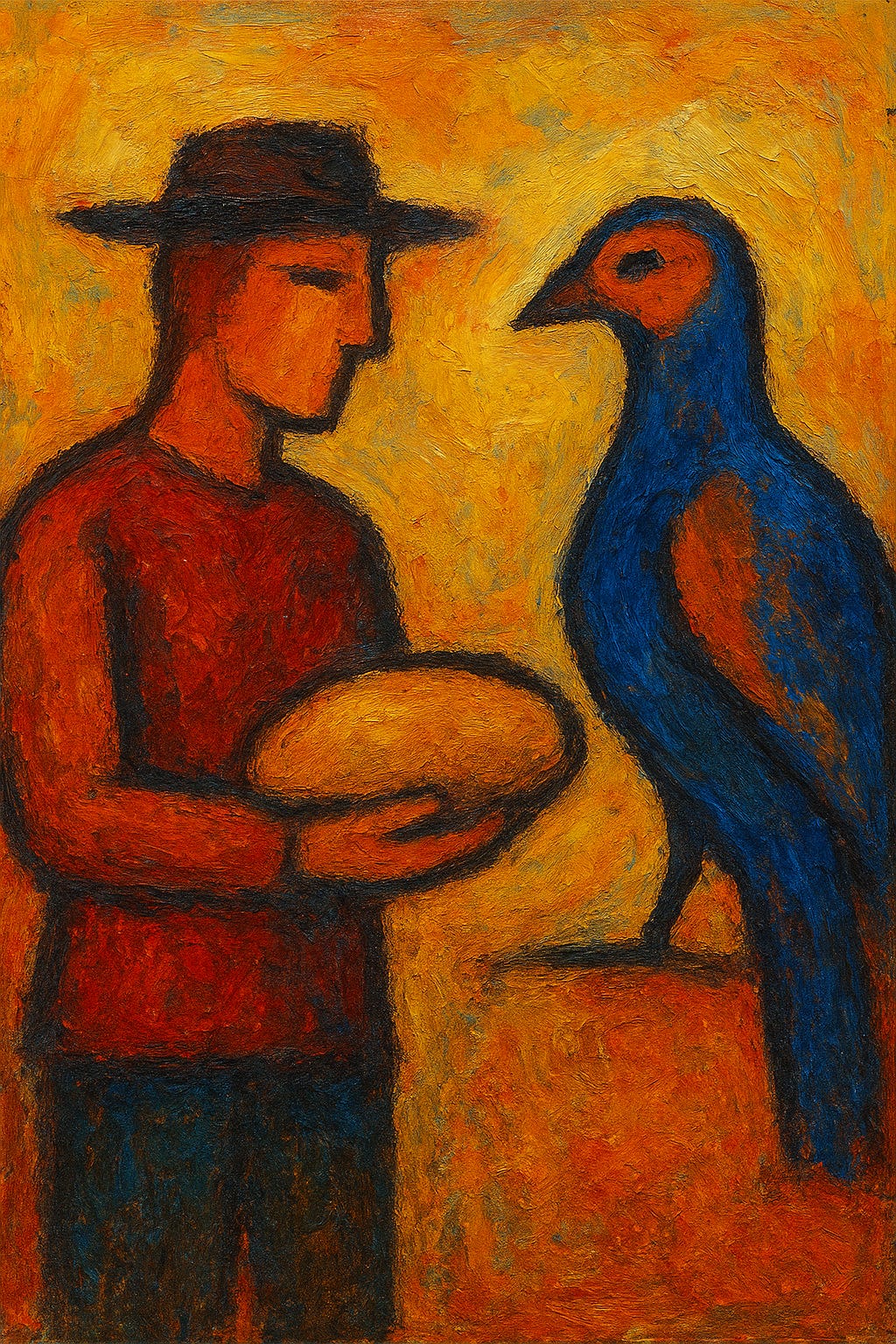A Year's Progress
Thanksgiving
The turkey found the pilgrim sitting alone on a stump at the edge of the clearing, scratching figures into a piece of bark with a charred stick.
“Planning the menu, I see,” the turkey said, settling its considerable bulk onto a nearby rock. The November wind ruffled its bronze feathers, and it tucked its wattled head against the chill.
William Bradford looked up, unsurprised. After a year in this strange land, a talking turkey barely registered as remarkable. He had seen stranger things: corn that grew taller than men, fish so thick in the rivers you could walk across their backs, and a people who had saved his colony from certain death and asked nothing but friendship in return.
“We must feed ninety Wampanoag and fifty of our own,” Bradford said. “Governor’s burden, this. Massasoit’s people have been hunting for three days already. Deer, mostly.”
“Venison,” the turkey said, as if tasting the word. “A fine start. What else?”
Bradford consulted his bark. “Wild fowl, certainly. Duck. Goose.” He paused, eyeing the turkey with what he clearly hoped was subtlety. “Perhaps some of your, ah, kind.”
“I would advise against that.”
“You would, wouldn’t you.”
The turkey shifted on its rock, its dark eyes catching the late afternoon light. “Consider the occasion, William. Three days of celebration. A harvest feast to mark your survival, your alliance with Massasoit, your gratitude to the Almighty for delivering you through pestilence and starvation. Surely such an occasion calls for foods that celebrate life rather than end it.”
Bradford set down his charcoal stick. “We nearly starved last winter. Half our number died. Forgive me if I find your argument somewhat abstract when weighed against the memory of watching children waste away.”
“I do not ask you to forget,” the turkey said. “I ask you to remember differently. You survived because the Wampanoag taught you to plant corn, to fish, to live with this land rather than against it. Squanto showed you how to bury fish with your seeds. He did not show you how to slaughter.”
“He also showed us where to find eels.”
“Eels are a grey area. I am prepared to concede eels.”
Bradford almost smiled. He had grown gaunt over the past year, his face weathered beyond his thirty years, but something in the turkey’s earnestness seemed to lighten him.
“What would you have us serve, then? Corn and squash alone?”
The turkey stood, fluffing its feathers with evident enthusiasm. “You have no idea what riches surround you. Pumpkins, roasted with maple syrup until they caramelize. Cranberries stewed into a sauce so tart it makes your eyes water. Corn prepared a dozen ways: succotash with beans and peppers, cornbread baked in clay ovens, hominy porridge sweetened with honey. Chestnuts. Walnuts. Wild onions braised in their own juices.”
“A feast for rabbits.”
“A feast for people who wish to see another spring. Every animal you slaughter is one less to breed come February. Every deer taken now is venison you cannot smoke for the hungry months ahead. Prudence and mercy align here, William. Surely your God smiles on both.”
Bradford picked up his bark again, studying his figures. The turkey could see columns of numbers, crude drawings of birds and deer, calculations of mouths to feed and days to stretch. The arithmetic of survival, rendered in charcoal.
“The men will not accept it,” Bradford said finally. “They have been dreaming of roasted meat for months. Wild fowl, especially. They speak of nothing else.”
“Then give them something that satisfies the dream without the killing. Something that looks like fowl, tastes like fowl, but spares actual fowl the inconvenience of being eaten.”
Bradford looked up sharply. “What manner of witchcraft do you propose?”
“Not witchcraft. Ingenuity.” The turkey hopped down from its rock and waddled closer, lowering its voice as if sharing a great secret. “There is a preparation the Wampanoag make from beans, pressed and shaped and seasoned with sage and wild herbs. Properly prepared, smoked over hickory, it takes on a texture not unlike flesh. The Narragansett call it something I cannot pronounce, but I have taken the liberty of devising my own name.”
“Which is?”
The turkey drew itself up to its full height, its chest puffed with unmistakable pride. “Tofurkey.”
Bradford stared at the bird for a long moment. Then he began to laugh, a sound rusty with disuse, creaking out of him like a door too long closed.
“Tofurkey,” he repeated. “You expect me to serve the Governor of Plymouth Colony and the great sachem Massasoit something called tofurkey.”
“I expect you to serve them something delicious that does not require explaining to ninety warriors why their English allies spent the harvest festival massacring the local wildlife. Diplomacy, William. Think of it as diplomacy.”
The wind picked up, carrying with it the smell of woodsmoke and fallen leaves. Somewhere in the distance, Bradford could hear voices calling, the sounds of preparation, of a community readying itself for celebration. He looked down at his bark, at the columns of numbers and the crude drawings, and then he looked at the turkey.
“Show me how to make it,” he said.


